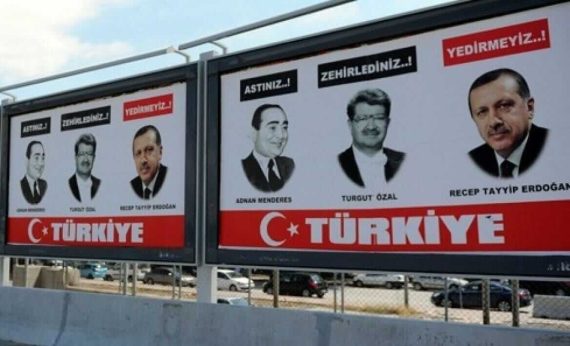One major question regarding the failed coup attempt in Turkey on the night of July 15th, 2016 is: why did millions of people flood into the main streets and squares of Turkey to stop the coup when the rebel soldiers declared a curfew, and furthermore started shooting and even bombing the civilians? Was it just because President Erdoğan could reach out to the masses via his Facetime app and deliver his message of “Go to the streets and give them their answer”?
Recommended
I have made this long intro just to make one point clear. The Turkish armed forces have traditionally thought that, when it deems it necessary, it has the right to punish the politicians by crashing the democracy with a coup. But in fact, the military enforced all the previous coups (in 1960, 1971, 1980 and 1997) not because it had the right, but it had the might to do so. They had the tanks and civilians did not, this simple. As of 2016, the military still has the tanks and the civilians still don’t. Everybody knew this, so did President Erdoğan. And Erdoğan also knew that the military continues to be the same old military. Despite all the changes it went through, there was one untouched characteristic: they saw plotting a coup as a natural right of theirs.
Since his party came to power in 2002, Erdoğan has long been worried about a coup against his party, Justice and Development Party (AK Party). The AK Party has won five consecutive elections (a record in Turkish history) and received over 49 percent of the overall votes in the most recent one. However, the curse was still out there. Erdoğan and AK Party politicians kept their eyes open for the tanks in the streets of Ankara. For many, a coup was an inevitable end for the AK Party, which did not give up winning the democratic elections one after another. Erdoğan himself had lost his seat as the mayor of Istanbul in the aftermath of the 1997 coup and spent 4 months 10 days in prison. He was seriously warned a decade later in 2007 with a military memorandum and his party narrowly escaped from being closed by just one vote in the constitutional court in 2008.
Hence, Erdoğan and his followers long expected a coup and probably gave some thought to what to do if/when the day comes. Nobody did anything for the PM Menderes when he was arrested by a colonel in 1960 and was sent to death row in a year. Nobody came to the help of Demirel, Erbakan and all the other politicians in times of coups. But this time the story would be different. Erdoğan has long stressed that he did and will stand firm against any undemocratic intervention. He asked his followers to do the same and his followers had long promised to be ready. It was a matter of humor for the Turkish public opinion to see Erdoğan being greeted by his fans in shrouds (the cloth in which Muslims are buried upon death) in 2013. But the message was serious and clear: we are behind you ‘to death.’
In short, people did not flood into the streets to defend their PM Menderes in 1960 partly because they had no clue about how Menderes’ life would be brutally concluded by the junta and partly because they had no clue about what they could do to prevent or reverse the coup. The same went for the following coups of Turkey up until the one in 2016. This time, people were ready. They had been reminded of the bitter end of earlier politicians and were motivated to defend their votes and elected politicians against a coup. In other words, both Erdoğan and millions of his followers (plus, even greater millions of the entire Turkish electorate) were ready for a coup to occur.
The only error was, they long waited for a Kemalist coup to attempt to crash the Turkish democracy. However, the address was different this time as Gülenists were behind the coup. Nor was the brutality of the coup expected, as it was the most brutal attempt in Turkey ever, with 240 lost lives to defend the democratic regime. Nevertheless, Erdoğan and AK Party were clear on what to do against a coup and with this expectation, they transformed the Turkish electorate on what to do in case a junta tries to crash the democratic process in Turkey. Hence, Turkish voters had learnt their lesson, were ready and waiting for the coup even if they did not know when or from where exactly it would show up. I hope the Turkish military can also learn its lesson and eventually understand that it is not their job to teach people how not to vote. If there is one lesson the failed Gulenist coup attempt of July 15 can teach to the rest of the military, it is the unquestionable stupidity and extreme danger of plotting a coup in 21st century Turkey.
Note: The article picture at the top is a famous AK Party banner from 2013. Photos (from left): Former PM Menderes (text: you hanged him!), former PM and President Özal (text: you poisoned him!), and Erdoğan (text: we won’t feed him to you)





